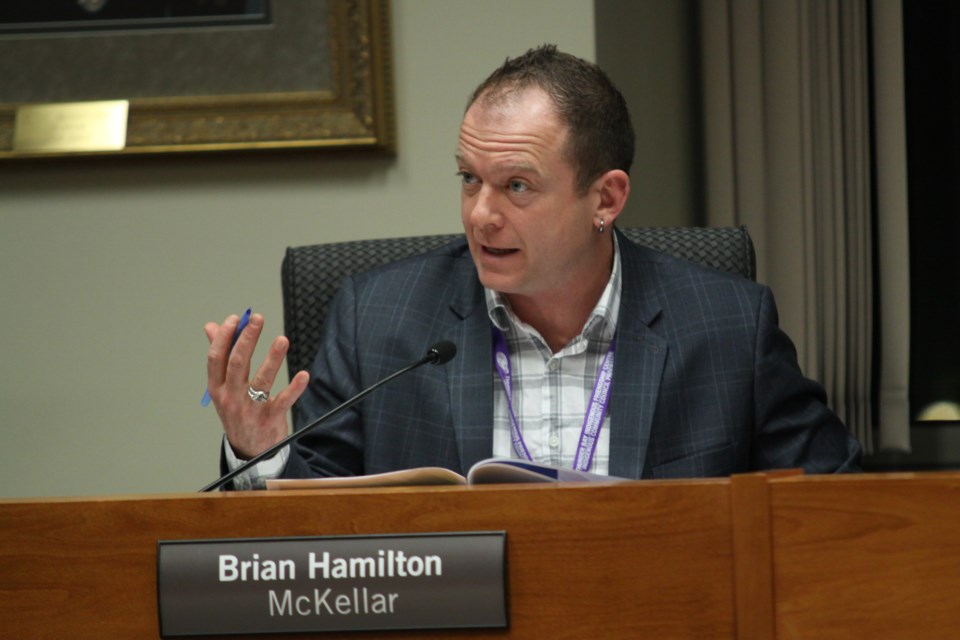THUNDER BAY – Thunder Bay’s city council expressed impatience with limited provincial and federal support on issues of crime, mental health, and addictions Monday, as it approved a new provincially-mandated community safety and well-being plan.
The plan sets goals like building a mental health and addictions crisis centre, decreasing incidents of racism, reducing Indigenous homelessness by 50 per cent by 2027, and boosting transitional and supportive housing.
Provincial and federal governments aren’t providing adequate funding to achieve those goals, councillors warned, leaving the city overwhelmed by issues like homelessness and the opioid crisis.
Coun. Brian Hamilton argued forcefully the municipal government should “put some skin in the game” to fill those gaps, even if they’re in areas of provincial and federal responsibility.
"If we as a municipality put money on the table, maybe that would encourage the province," he said. "I’m very interested in making some bold moves to make that happen… We’ve been advocating for a long time. You see in some of the comments tonight, people are getting frustrated."
“This is so important – this is our children, this is intergenerational, and there’s a lot of room for more action, in my mind.”
Mayor Bill Mauro, on the other hand, said while the city could play a supporting role, the problems were beyond its jurisdiction and its ability to solve.
“We already do a fair bit,” he said. “People would argue there’s more we can do as a municipality, but this fundamentally will require the federal government when it comes to homelessness, the provincial government on mental health and addictions and poverty reduction.”
The city already puts millions a year toward supporting community groups like the Shelter House, he said, calling that uncommon for a municipal government.
Mauro called the recent hiring of six new police officers another example, while acknowledging calls to reduce spending on police. That could be possible if upper levels of government stepped up on issues like mental health, he said.
Ontario municipalities are required to submit five-year community health and well-being plans by July 1, part of an effort to “address the root causes of crime and complex social issues,” according to the provincial government.
The 2021-2025 plan approved unanimously by council Monday outlines six priorities: racism and discrimination, housing, mental health and substance misuse, community and gender-based violence, poverty reduction, and supports for children, youth and families.
The plan highlights local issues like a spike in mental health calls to police, violent crimes reported at rates far above the provincial average, and a rapidly worsening opioid crisis, with deaths in the Thunder Bay District Health Unit jumping to 65 last year - an increase of over 70 per cent from the year before.
The plan was developed with feedback from 779 people through a survey, public forums, and wide-ranging focus groups.
Coun. Aldo Ruberto said it was heavy on “upstream” strategies like supportive housing and poverty reduction, questioning whether it addressed concerns like violent crime and drug trafficking.
“We’ve had lots of plans,” he said. “When I get phone calls, when I go out and about, [the concerns are] always about the criminals, the drugs, the gangs.”
Lee-Ann Chevrette, the city’s crime prevention council coordinator, said the plan's goals would bring immediate impacts.
“I don’t want it to come across that this is strictly an upstream plan, because we know we have significant issues in our community now that we need to deal with,” she said.
Ruberto agreed efforts from upper levels of government were sorely lacking, saying harsher sentencing and greater enforcement against drug trafficking should go hand-in-hand with housing and safer supply initiatives.
Recent funding announcements on mental health fell short of solutions the community had called for, like a mental health and addictions crisis centre, he said.
“I still don’t see a concerted effort between our federal and provincial governments on [the opioid crisis],” he said, comparing that failure to rapid government action on the pandemic.
In the face of deep challenges, the city’s plan would be measured not on its intentions but on how it creates real change in residents’ lives, Ruberto said.
“I look for action and results now,” he said. “A few people said, this is not our jurisdiction, and you’re right… but it affects our lives. Those are the times when we have to step up.”
Council voted to approve the plan and also dissolve the crime prevention council Monday, replacing it with a community safety and well-being advisory committee that will coordinate action on the plan, providing yearly updates to council.
The city must update the plan every four years under provincial legislation.
